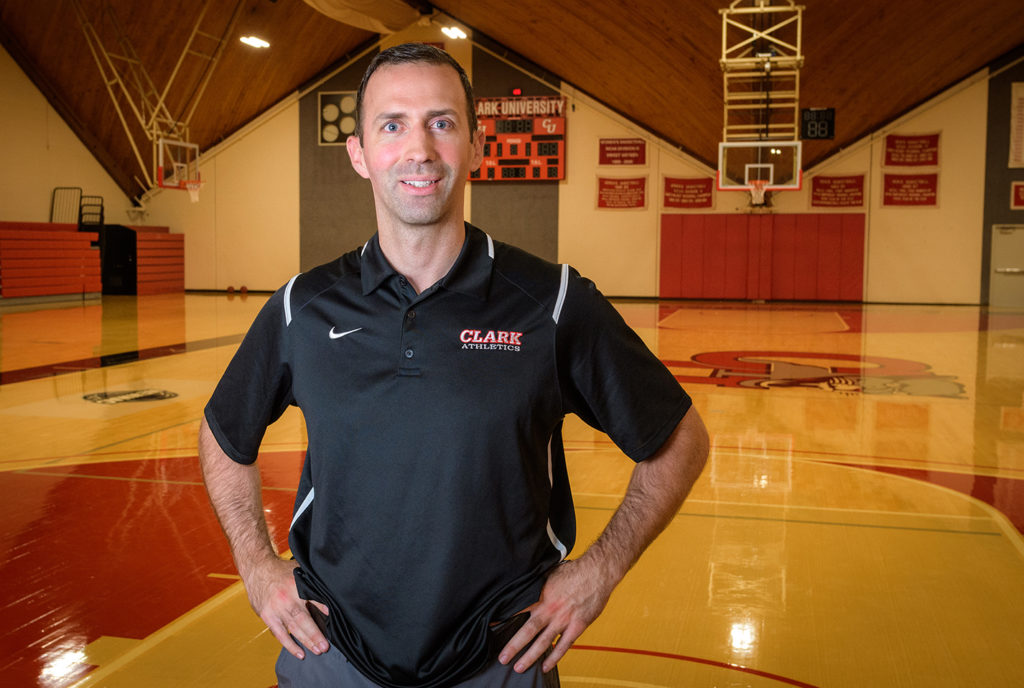For new men’s basketball coach Tyler Simms, Clark ‘feels like home’

Tyler Simms came to Clark with 10 years of coaching experience, including at Brown University, a Division I program.
When Tyler Simms emerged from his interview for the Clark University men’s basketball coaching position, his first call was to his mom. He recounted for her the things that excited him about the job, most obviously the opportunity to lead a program after years spent as an assistant coach.
But there was something more. Simms liked what he heard about the Clark ethos, which emphasizes academic rigor and community involvement. He learned about Clark’s hands-on learning approach and its partnerships with the University Park Campus School and the Boys and Girls Club. For the former education studies major who played his basketball at a Division III liberal arts college in Hartford, Conn., there was something familiar about the environment and expectations at Clark, something that fit.
“This feels like home,” Simms told his mother. “It feels like the perfect job for me.”
Clark agreed.
Simms was hired in April to take the coaching reins from Paul Phillips, who retired after 21 seasons as head of the men’s program. Clark marks a return to DIII for the Bourne, Mass., native, who captained the Trinity College team and made two NCAA Tournament appearances during his playing days. He arrives at Clark with 10 years of college coaching and recruiting experience, including stints at Mercyhurst University (where he earned a master’s degree in organizational leadership), Siena College, Trinity, and, most recently, Brown University, a Division I program where he served as assistant coach.
“If you haven’t been around it or coached it, you may not know how good Division III basketball is,” he says. “It takes a lot of talent, time, and effort to compete and win at this level. I very much see myself as a DIII guy: I love the competitiveness, the spirit, and the camaraderie. My goal is to create an atmosphere where our student-athletes care about winning basketball games, but they also care about their teammates and about the experience they’re having at Clark.”
Simms says his father, a college football coach, and his mother, a public school teacher, endowed him with “a passion for teaching and leading others. They really shaped and inspired me.” Much of his childhood was spent in gyms and on fields, particularly on the sidelines at Stonehill College football games, where his dad served as offensive coordinator. The energy, the strategy — the life — imprinted itself so deeply it left little doubt about Simms’ ultimate career path.
“Once I finished my college playing career, I was already transitioning into coaching,” he recalls with a smile.
He’s a student of the game, drawing on the teachings of the legendary UCLA coach John Wooden and current Boston Celtics coach Brad Stevens for inspiration. “Brad Stevens is a former DIII guy who played at DePauw University,” he notes. “His career, his demeanor, how hard his teams play at both ends of the floor are all things I’m learning from him.”
Simms acknowledges the past successes of Clark basketball, including multiple NCAA appearances and conference championships. He inherits a team with raw talent but not a lot of size, one that struggled to a 5-20 record last year. To compensate, Clark will prioritize strong defense.
“We have to put ourselves in the best position possible to win, and we’ll do it by blending our physical abilities with an approach that works to our advantage,” he says. “At the end of the day, you have to have a defensive identity to be successful. Playing defense with passion, toughness, and togetherness will be the identity of Clark basketball.”
Simms expects his returning players to become rallying points on this young team. He cites his captains Brendan Kittredge ’20 (“a very tough guard and a good shooter”), Tyler Davern ’21 (“a skilled forward who can be one of the better players in the league”), and Biko Gayman ’21 (“a quick point guard and vocal leader on and off the court”) as critical to shaping the squad. He’s also eyeing more prominent roles for Antonio Lapeyrolerie ’22, a 6-foot-4 forward from Plano, Texas, and Joel Areaga ’22, a 6-foot-2 guard from Wycote, Penn.
“I’ve talked to a lot of alumni, and they’re excited about the future,” he says. “People want to cheer for teams who give a great effort, who are passionate, and who symbolize who we are as a university. But if you want a program people will follow, you’ve got to win.”
Simms won’t truly know what he’s got until October 15, when practice officially begins. He’s itching to get his team onto the court.
“It’s great to be a part of a program with tremendous support and a history of success,” he says. “The good thing is history has a way of repeating itself, and that’s what we aim to do here at Clark.”


